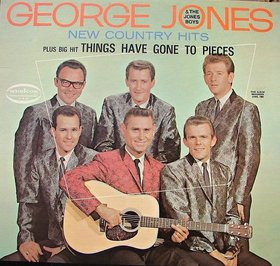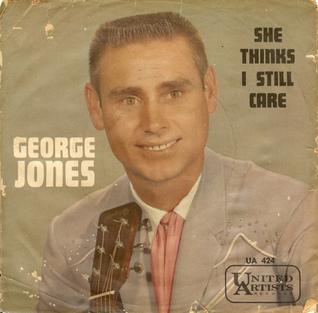
Carl Lee Perkins was an American guitarist, singer and songwriter. A rockabilly great and pioneer of rock and roll, he began his recording career at the Sun Studio, in Memphis in 1954. Among his best known songs are Blue Suede Shoes, Honey Don't, Matchbox and Everybody's Trying to Be My Baby.

Gladys Knight & the Pips were an American R&B, soul, and funk family music group from Atlanta, Georgia, that remained active on the music charts and performing circuit for over three decades starting from the early 1950s.

George Glenn Jones was an American country musician, singer, and songwriter. He achieved international fame for a long list of hit records, and is well known for his distinctive voice and phrasing. For the last two decades of his life, Jones was frequently referred to as "the greatest living country singer", "The Rolls-Royce of Country Music", and had more than 160 chart singles to his name from 1955 until his death in 2013.

Johnny Paycheck was an American country music singer and Grand Ole Opry member notable for recording the David Allan Coe song "Take This Job and Shove It". He achieved his greatest success in the 1970s as a force in country music's "outlaw movement" popularized by artists Hank Williams Jr., Waylon Jennings, Willie Nelson, Billy Joe Shaver, and Merle Haggard. In 1980, Paycheck appeared on the PBS music program Austin City Limits, though in the ensuing decade, his music career slowed due to drug, alcohol, and legal problems. He served a prison sentence in the early 1990s, and his declining health effectively ended his career in early 2000.

Ronnie Lee Milsap is an American country music singer and pianist.

Joe Logan Diffie was an American country music singer and songwriter. After working as a demo singer in the mid 1980s, he signed with Epic Records' Nashville division in 1990. Between then and 2004, Diffie charted 35 singles on the Billboard Hot Country Songs chart, five of which peaked at number one: his debut release "Home", "If the Devil Danced ", "Third Rock from the Sun", "Pickup Man" and "Bigger Than the Beatles". In addition to these singles, he had 12 others reach the top 10 and ten more reach the top 40 on the same chart. He also co-wrote singles for Holly Dunn, Tim McGraw, and Jo Dee Messina, and recorded with Mary Chapin Carpenter, George Jones, and Marty Stuart.

This is a discography of American musician Ray Charles.

I Am What I Am is an album by American country music artist George Jones, released in 1980 on Epic Records label. On July 4, 2000, the CD version was reissued with four previously unreleased bonus tracks on the Legacy Recordings label.

Hello, I'm Dolly is the debut studio album by American singer-songwriter Dolly Parton. It was released on September 18, 1967, by Monument Records. The album was produced by Fred Foster. It peaked at number 11 on the Billboard Top Country Albums chart. The album spawned two top 40 hits, "Dumb Blonde" and "Something Fishy", which peaked at numbers 24 and 17, respectively.

Ernest Bert Ashworth was an American country music singer, broadcaster, and longtime Grand Ole Opry star. Signed to the Hickory label, he recorded two studio albums in his career and charted several singles on Billboard Hot Country Songs, including the number one "Talk Back Trembling Lips" and seven other top ten hits.

A Picture of Me (Without You) is an album by American country music singer George Jones. It was released in 1972 on the Epic Records label. The release was Jones' 47th studio album, his second solo LP for Epic Records, and is also one of four albums released by the singer during the year 1972 (two as a solo artist, and two duet albums with his wife Tammy Wynette) as producer Billy Sherrill wasted no time in flooding the market with new recordings by "the Possum". Jones's first album, George Jones (We Can Make It), made it to number 10 on the country albums charts but his second effort did better, rising to number three and featuring songs with a wider range of themes than those found on his Epic debut, which celebrated the happiness of new love. The album's title track was the only single release from it, peaking at #5 on the Billboard country singles charts.

New Country Hits is an album by American country music artist George Jones. It was released in 1965 on the Musicor Records label.

Grand Ole Opry's New Star is the debut studio album released by George Jones in November 1956 with Starday Records. Produced by Jones' manager Pappy Daily, the album was recorded during early sessions in 1954, throughout 1955, and other sessions in 1956. It is also the first album to be released on the Starday label, a label only four years old.

The albums discography of American country artist, George Jones contains 80 studio albums, 132 compilation albums, three live albums, ten video albums and seven box sets. Of his studio albums, 69 are solo releases while 11 are collaborative releases. In 1956, Jones's debut studio LP was issued on Starday Records titled, Grand Ole Opry's New Star. The label only issued one studio effort, but would release a series of compilation. On Mercury Records, Jones released six studio LP's including Country Church Time (1959) and George Jones Salutes Hank Williams (1960). He switched to the United Artists label in 1962, where he released 13 studio LP's. Among these was a collaborative LP with Melba Montgomery called What's in Our Hearts (1963), which was his first to chart the Billboard Top Country Albums survey. He moved to Musicor in 1965. Among the label's studio LP's was I'm a People (1966), which reached the top of the Billboard country survey. Musicor also issued his first collaborative studio album with Gene Pitney, which made the Billboard country LP's chart and the Billboard 200.

Kashif Saleem was an American singer, songwriter, and record producer from New York City. As a teenager, Kashif joined the funk group B. T. Express. He studied Islam and changed his name from Michael Jones to Kashif. He later signed with Arista Records enjoying success as a solo artist.
The discography of Buck Owens, an American country music artist, consists of 39 studio albums, 16 compilation albums, 9 live albums, 97 singles, and 12 B-sides. After recording under the name Corky Jones and releasing a string of singles in the mid-1950s, Owens signed a recording contract with Capitol Records in February 1957.

"She Thinks I Still Care" is a country song written by Dickey Lee and Steve Duffy. First popularized by George Jones, the song has been recorded by many artists, including Connie Francis, Anne Murray, Elvis Presley and Patty Loveless.

The singles discography of Elvis Presley began in 1954 with the release of his first commercial single, "That's All Right". Following his regional success with Sun Records, Presley was signed to RCA Victor on November 20, 1955. Presley's first single with RCA, "Heartbreak Hotel", was a worldwide hit, reaching the No. 1 position in four countries and the top 10 in many other countries. Other hit singles from the 1950s include "I Want You, I Need You, I Love You", "Don't Be Cruel", "Hound Dog", "Love Me Tender", "Too Much", "All Shook Up", "(Let Me Be Your) Teddy Bear", "Jailhouse Rock", "Don't", "Wear My Ring Around Your Neck", "Hard Headed Woman", "One Night", "(Now & Then There's) A Fool Such as I", and "A Big Hunk o' Love". On March 24, 1958, Presley entered the United States Army at Memphis, Tennessee, and was stationed in Germany. He left active duty on March 5, 1960.

The singles discography of American country artist, George Jones, contains 182 singles. Of the total, 136 were released with Jones as the solo artist. In addition, 31 were issued with Jones being part of a collaboration. Thirdly, eight singles were issued with Jones being part of a featured act. Fourthly, seven released were promotional singles. Additionally, 14 songs that are not released as singles are included that made any major chart. Finally, 21 music videos which were first issued as singles are also listed. Jones had his first chart success in 1955 with several top ten Billboard Hot Country Songs singles: "Why Baby Why", "What Am I Worth" and "You Gotta Be My Baby". After several more top ten releases, "White Lightning" became his first to top the Billboard country chart. Along with "Who Shot Sam", both singles were also his first to make the Hot 100 charts.

"You Made Me the Thief of Your Heart" is a song by Irish singer-songwriter Sinéad O'Connor, written by Bono, Gavin Friday and Maurice Seezer for the soundtrack to the 1993 film In the Name of the Father, starring Daniel Day-Lewis and Emma Thompson. The song is produced by English musician Tim Simenon and does not appear on any of O'Connor's studio albums, but in 1997, it was included on her first compilation album, So Far... The Best Of. It was critically acclaimed and a top 5 hit in both Ireland and Poland, while peaking at number 19 in Finland and number 42 in the UK. On the Eurochart Hot 100, it reached number 43. The music video was directed by Jim Sheridan and nominated for an award at the 1994 MTV Music Awards.

















